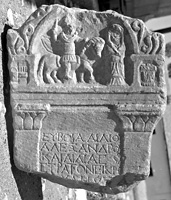 MAMA XI 257 (Laodikeia)
MAMA XI 257 (Laodikeia) 
Funerary stele of Euboia, slave
- Type of monument:
- Funerary stele.
- Location:
- Ladık (Laodikeia): not recorded.
- Description:
- Grey marble stele, broken above and below. Arched pediment, with half-palmettes at left and right and vine-scroll pattern on the outer moulding. In the pediment, in relief, (l.) male figure on horseback in billowing cloak, right hand raised, holding uncertain object; (r.) standing female figure in veil and pallia. At lower left and right corners of pediment, depictions in relief of (l.) uncertain object, (r.) wool-basket. Inscription in inset panel on shaft; to left and right, pilasters with stylised capitals.
- Dimensions:
- Ht. 0.64+; W. 0.55 (pediment), 0.49 (shaft); Th. 0.21; letters 0.020-0.035.
- Record:
- AH notebook copy; photograph (1957/87=5930).
- Publication:
- None.
- Date:
- Second century AD.
Εὔβοια Αἰλίου
Ἀλεξάνδρου
καὶ Αἰλίας hed.
Στρατονείκης
5[δο]ύλ̣η hed. Σ̣[-]
- - - - - - - - - -
Euboia, slave of Aelius Alexandros and Aelia Stratoneike...




The large concentration of freedmen Aelii at and around Laodikeia is noted by Mitchell 1993: I 156, who argues for the existence of a large imperial estate in this region from the reign of Hadrian onwards (cf. MAMA XI 256 [1957/90]: Aelius Longus). Euboia was apparently owned by a pair of former imperial slaves from this large estate. The relief depicts a female figure alongside a rider-god: see the commentary to MAMA XI 365 (1956/191: Komitanassos).